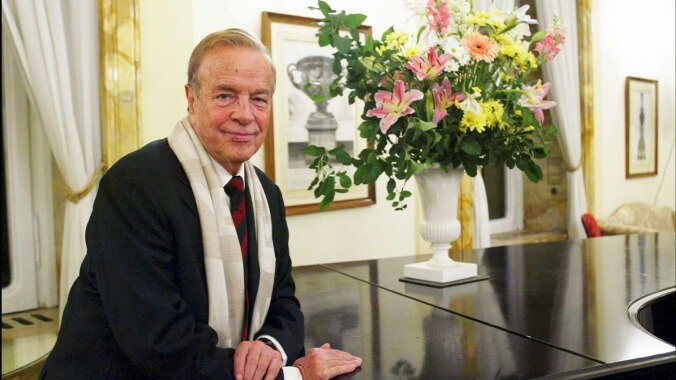R.I.P. director Franco Zeffirelli

Franco Zeffirelli has died. Although his long career contained many distinct and notable phases—including fighting as a member of the Italian anti-Fascist resistance movement in World War II, directing operas in cities ranging from Paris to New York, and serving a 7-year stint in the Italian senate—Zeffirelli was best known to international audiences as a director of films, most especially for his long-celebrated adaptation of William Shakespeare’s Romeo And Juliet.
Born in Florence in the 1920s, Zeffirelli’s long association with the opera began almost as soon as he was born—his last name, invented by his mother because the child had been born out of wedlock, is a reference to Mozart’s Idomeneo. Educated in the arts, he broke into film shortly after the end of the war (where he served as an interpreter for British troops), acting as an assistant director on a film by neorealist pioneer (and Zeffirelli’s lover) Luchino Visconti. But he quickly returned to the stage, spending the ’50s and ’60s building a reputation for himself as an operatic director of widely recognized skill. Zeffirelli didn’t return to film until 1967, when he directed the first of four Shakespeare adaptations that would help define his career: Elizabeth Taylor and Richard Burton’s The Taming Of The Shrew.
But Zeffirelli’s real breakout in the world of Shakespearean film directing wouldn’t come until the next year, when he tried his hand at Romeo And Juliet. Casting teenagers Leonard Whiting and Olivia Hussey in the title roles, Zeffirelli created a lush, emotionally charged vision of Renaissance-era Verona, one that won him the only two Oscars of his career. (For Cinematography and Costume Design, although the film was also nominated for Director and Best Picture.) Celebrated by critics—and foisted upon high school English students for generations to come—the film is still held up as one of the best versions of the Bard’s work ever to make it to the screen.
Now a household name—among households where “famous directors of Shakespeare adaptations” were a frequent topic of conversation, at least—Zeffirelli was free to pursue those projects that interested him, which often dovetailed with his devout Roman Catholicism. (In later years, he would come under fire as a politician for supporting the church’s draconian stances on topics like homosexuality and abortion.) His film and TV projects from this era include Brother Son, Sister Moon, about the life of St. Francis of Assisi, and a TV miniseries about the life of Christ. (And, on a less hagiographic note, a remake of boxing flick The Champ with Jon Voight in the title role.)
Zeffirelli split the rest of his career between the stage, the screen, and politics, sometimes blending parts of them together, as with his Verdi adaptation Otello in 1986. He returned to the Shakespeare well one last time for 1990's Hamlet, casting Mel Gibson in the title role opposite Helena Bonham Carter and Glenn Close. His last feature was 1999's autobiographical Tea With Mussolini. (Our former editor, Keith Phipps, wasn’t a fan, dubbing it “dramatically flaccid.”) Shortly after, he entered politics, where he served as a member of Silvio Berlusconi’s center-right political base.
Zeffirelli’s reputation among the various stars who worked with him over the years—often at extremely young ages—is decidedly mixed. In interviews with us, performers like C. Thomas Howell and Brooke Shields have been effusive in their praise; Shields dubbed the filming of Zeffirelli’s critically panned Endless Summer “not pleasant,” but also credits him with pushing her to make it one of the only films of her early career that she’s “really proud of.” But there have also been allegations of abusive behavior, sometimes of a sexual nature. Bruce Robinson (who appeared as Benvolio in Romeo And Juliet) has claimed that the sexually aggressive character Uncle Monty from his Withnail & I is based on Zeffirelli’s persistent harassment of him. And in 2018, actor Johnathan Schaech came forward with an accusation that Zeffirelli sexually assaulted him during the filming of 1994's Sparrow. (Zeffirelli’s family has denied the allegations.)
Zeffirelli died in Rome this week, shortly after contracting pneumonia. He was 96.